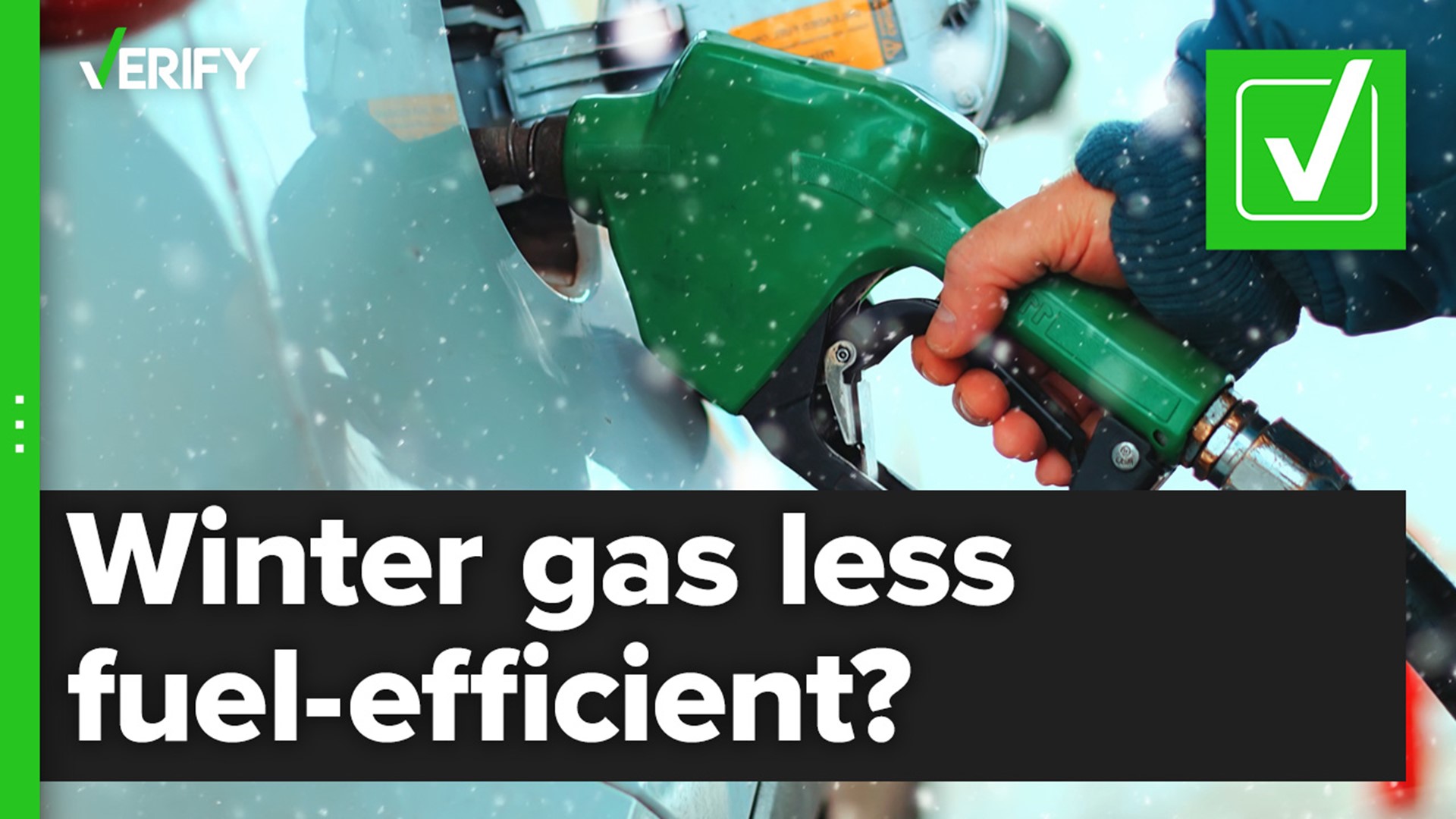When you fill up your car, you probably don’t think too much about the type of gas that goes into it. But in the fall, gas stations start selling a winter blend of fuel instead of a summer blend.
VERIFY viewer Deanna recently sent a text to our team asking if winter blend gas lowers her car’s fuel efficiency.
THE QUESTION
Is winter-blend gasoline less fuel efficient than summer-blend gasoline?
THE SOURCES
- Environmental Protection Agency (EPA)
- GasBuddy
- American Automobile Association (AAA)
- FuelEconomy.gov, the official U.S. government source of fuel economy information
- Home Service Oil Company, supplier of heating oil, diesel fuels and gasoline
THE ANSWER
Yes, winter-blend gasoline is less fuel efficient than summer-blend gasoline, but there’s not a significant difference.
WHAT WE FOUND
Every fall, the type of gas you get at the pump changes. This switch is made because under the Clean Air Act, gasoline refineries are required to make two blends of gas — one for the summer and one for the winter.
In the warmer months of the year, gas has a greater chance of evaporating from a car’s fuel system, which can produce additional smog and increased emissions. That’s why gasoline refiners produce a summer fuel blend that reduces the chance of gas evaporation, or has a lower Reid vapor pressure (RVP).
Winter-blend gas, on the other hand, needs to have a higher RVP than summer-blend gas. This is because the fuel must be able to evaporate in freezing weather in order for the engine to turn over and operate properly.
Certain additives in winter-blend gas, such as butane, tend to have less energy content than those found in summer-blend fuel. Butane is typically used as a lighter fluid and as a secondary ingredient in fuel canisters used for gas grills and camping. When present in fuel, butane's higher RVP limits how much of the gas can be included in summer-grade fuel.
More from VERIFY: No, the U.S. isn’t going to run out of diesel fuel in 25 days
In a 1995 study, the most recent data available, the Environmental Protection Agency (EPA) found that typical winter conventional gasolines contain 1.7% less energy than typical summer conventional gasolines. This means that winter-blend gas is slightly less fuel efficient than summer-blend gas, but the difference isn’t that significant.
“Winter-blend gasoline does not make your vehicle more fuel efficient. Gas that has more energy will make your car more fuel-efficient, so summer-blend gas would provide greater fuel economy,” an EPA spokesperson told VERIFY.
But it’s not just the fuel blend that can contribute to lower gas mileage in the winter. Excessive idling, or warming up a vehicle, can also contribute to lower fuel economy when it’s cold out.
“Excessive idling gets you exactly zero miles per gallon. Even if you’re warming up your car for just a few minutes, you’re burning fuel!” the Home Service Oil Company says on its website.
More from VERIFY: Yes, electric vehicles lose range in cold weather
Most car manufacturers recommend idling for only about 30 seconds in cold temperatures before driving, according to FuelEconomy.gov, the official U.S. government source of fuel economy information. This will help the engine warm up faster, which will allow the heat to turn on sooner and decrease fuel costs, as well as reduce emissions.
The Home Service Oil Company and FuelEconomy.gov both share tips on how to improve your car’s fuel economy in winter:
- Park in a warmer place, like a garage, to increase the initial temperature of your engine and cabin.
- Combine trips when possible so that you drive less often with a cold engine.
- Check your tire pressure regularly.
- Use the type of oil recommended by your manufacturer for cold-weather driving.
- Remove accessories that increase wind resistance, like roof racks, when not in use.
- Don't use seat warmers or defrosters more than necessary.

